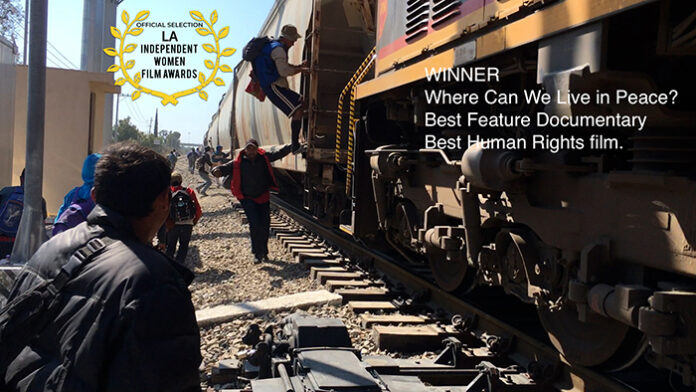SUBMITTED ARTICLE
Documentary filmmaker Judy Jackson’s award-winning film Where Can We Live In Peace? has a special screening at the Fritz Cinema on Saturday, Nov. 4 at 3 p.m.
The film documents the work of ABBA house, a migrant shelter founded by Pastor Ignacio Ramirez in Celaya, Mexico. Those who have been forced to leave their Central American homes are offered kindness and hope — a brief respite from the hardships and dangers they face in their desperate search for a place where they can bring up their children in safety.
Many migrants dream of “el otro lado,” new lives in the United States. Border crossings today (about 9,000 a day) are at an all-time high, as are deportations. The migrant crisis has become heavily politicized and migrants are increasingly demonized. The U.S. border is a 2024 election issue and President Joe Biden has authorized an addition to the border wall, something he said he would never do. Thousands of migrants huddle in makeshift camps on the Mexican side, where gangs rape women, kidnap and extort men.
Jackson’s poignant and compassionate film draws us into the world of the ABBA shelter and the lives of migrants who find comfort and support there, a place where each is treated with kindness and dignity — as a human being. Throughout the film, we hear the migrants’ voices as they recount their difficult stories, explaining why they had to leave homes in Central America. The reasons are mostly related to corruption, gang violence, climate change and abject poverty.
They frequently travel by jumping on and off freight trains, infamously known as “La Bestia.” Sadly, and inevitably, there are often accidents, which shatter dreams of working in America and sending money back to support their families. ABBA is the only shelter in Mexico that looks after migrants who have lost limbs. It works with the International Committee of the Red Cross to provide therapy, counselling and protheses. The amputees have even formed a band.
Now Pastor Ignacio has a new vision. A donation of a huge piece of abandoned land means he can move forward with plans to build a cultural and human rights centre, a sanctuary where amputees can heal and plan new futures. Here, they will receive not only medical, psychological and physical help, but there will also be workshops to provide education, art and music therapy along with digital learning which could lead to jobs for those who are disabled. This new sanctuary is an example to the world of what is possible. Where Can We Live in Peace? screenings are raising money for this new centre.
Jackson, a former Salt Spring resident now living in Victoria, says the impulse for her latest film was driven by the personal loss and despair she experienced when her fiancé Neil tragically died of brain cancer. Overcome with grief, she read voraciously to try to find answers and support from others who had lost loved ones. Viktor Frankl’s Man’s Search for Meaning was the book that resonated most loudly. Frankl, an Auschwitz survivor who lost parents and his fiancé in the camp, observed that those who helped others, even a little, seemed to fare better than those who did not.
“So, with film funding for foreign stories increasingly impossible in Canada, I picked up a simple camcorder, headed to Mexico and, without a budget, learnt to film and edit on my own, and made Where Can We Live in Peace? And yes, it has helped me heal,” Jackson said.
Where Can We Live in Peace? has won multiple awards in Europe and North America.
Jackson has made more than 100 documentaries about human rights and social justice issues that have been widely broadcast in Canada, the U.S. and England. A complete list of her documentaries can be found at judyfilms.com.

